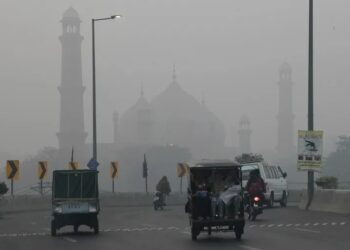(Written by: Abdul Basit Alvi)
In a recent press briefing, the Director-General of the Inter-Services Public Relations (DG ISPR) aptly stated that a secure Pakistan is a strong Pakistan. This simple yet powerful statement resonated with me so strongly that it compelled me to reflect on its deeper meaning. True strength in a nation is not defined solely by its economic wealth or military power, but by its ability to withstand challenges, adapt to changes, and ensure security and opportunity for its people. National strength is multifaceted, emerging from a harmonious blend of solid institutions, resilient infrastructure, a unified society, and a dynamic economy. It is the collective strength of these elements that enables a country to grow sustainably, safeguard its sovereignty, and secure its place in the global arena.
In today’s rapidly evolving and interconnected world, a nation’s strength is no longer measured just by its capacity for defense but also by its ability to build a stable, prosperous, and inclusive society. At the heart of a strong nation lies a robust economy, as economic strength directly impacts a country’s ability to meet the needs of its citizens, fund essential services, and assert itself on the global stage. A thriving economy is diverse, characterized by sustainable growth, a dynamic workforce, and industries that are resilient to external shocks such as recessions or disruptions in global supply chains.
A strong country invests in innovation, infrastructure, and its human capital. It fosters an entrepreneurial ecosystem and creates an environment where businesses can flourish. Economic resilience is achieved by diversifying industries and ensuring that the country is not overly dependent on one sector. Sound fiscal policies, a stable financial system, and strategic investments in critical areas such as technology, healthcare, and education are all essential for ensuring long-term economic strength.
Equally important is a country’s ability to defend its sovereignty and protect its citizens from external threats. While military power alone does not define national strength, a disciplined, well-equipped, and technologically advanced military is crucial for projecting power on the world stage. A nation’s defense capabilities reflect its strategic thinking, its alliances, and its ability to deter potential threats. Military strength goes beyond sheer numbers; it requires effective training, integration of advanced technologies, and a sophisticated intelligence infrastructure. Furthermore, national security encompasses more than just conventional defense; it must also address internal stability, the fight against terrorism, and the protection from modern-day threats like cyberattacks.
In today’s world, cybersecurity is becoming as vital as traditional defense forces. A strong country must prioritize both military readiness and digital security to safeguard its interests in an increasingly connected and digital world.
Moreover, a strong nation is underpinned by effective, transparent, and inclusive governance. Political stability plays a key role in building public trust, attracting investments, and maintaining law and order. A strong government provides a clear framework for the rule of law, enforces contracts, and protects the rights of its citizens. Effective governance includes a democratic system where power is exercised through accountable institutions that reflect the will of the people. A robust political system ensures checks and balances, upholds freedoms such as free speech and press, and protects human rights.
Political stability is crucial for fostering a society where all citizens have a stake in the nation’s future, ensuring that no group is left marginalized. Moreover, a strong political system addresses the needs of its people through sound policies on education, healthcare, housing, and welfare. These institutions provide the essential social services that contribute to individual well-being and societal progress.
The statement that “a secure Pakistan is a strong Pakistan” encapsulates a profound truth: national strength is not a singular measure, but rather the sum of multiple factors. A strong country is built on the foundation of security, a thriving economy, effective governance, and a military capable of protecting its interests. It is through the integration of these elements that a nation can truly secure a prosperous future for its citizens and make its mark on the global stage. A genuinely strong country is one where all its citizens, regardless of their ethnic, religious, or cultural backgrounds, feel a shared sense of belonging. Social cohesion acts as the bond that unites a nation, fostering a collective identity that transcends differences and brings people together to pursue common goals. Stability and harmony within society are rooted in respect for diversity and the fair treatment of every individual. By investing in inclusivity and equality, and providing opportunities for all to thrive, a nation fortifies its social fabric and enhances its resilience. When people believe they will be treated fairly, they are more inclined to contribute to the growth and well-being of their country. A strong nation ensures that the basic needs of its citizens are met, including access to quality education, healthcare, housing, and economic opportunities. A well-educated, healthy, and empowered populace is a fundamental pillar of national strength. Additionally, a strong country invests in research, development, and technology. In today’s fast-paced world, innovation is a key driver of competitive advantage. Nations that prioritize advancements in science and technology—such as artificial intelligence and renewable energy—position themselves as leaders in global development. Technological progress not only strengthens national industries but also enhances the quality of life for citizens. A resilient nation embraces digital transformation, fostering smart cities, sustainable energy solutions, and digital literacy programs. By leading in innovation, a country can expand its global influence and secure its economic and security needs in an increasingly digital landscape.
Global challenges like climate change, pandemics, and economic instability test the resilience of nations. A strong country is one that adapts and responds effectively to these challenges, often taking the lead in efforts to mitigate their impact on both its own people and the world. Environmental resilience, for example, requires a focus on sustainability and resource preservation, ensuring that future generations can thrive. Similarly, during health crises like the COVID-19 pandemic, a strong country must have the infrastructure, expertise, and policies in place to respond swiftly and effectively. In an interconnected world, a strong nation does not operate in isolation; it collaborates with other countries, sharing resources, knowledge, and strategies to address global issues such as climate change, health security, and economic inequality.
Many countries demonstrate their strength by ensuring safety across all key areas—military, economic, social, and environmental. For instance, Switzerland combines military neutrality, political stability, economic prosperity, and a high quality of life to foster internal cohesion and resilience against external threats, ensuring safety on all fronts. Singapore, with its world-class security forces, strong economy, efficient healthcare system, and strict law enforcement, has created a safe and secure environment in every aspect, making it a model of comprehensive national security. Similarly, Norway guarantees its safety and well-being through a robust welfare state, political stability, a well-equipped military, and a focus on environmental sustainability. These countries exemplify that true strength is found in the ability to balance defense, prosperity, social stability, and environmental security.
In the context of Pakistan, the country is situated in a geopolitically sensitive region and has long faced a complex range of internal and external security challenges. Pakistan’s strategic location at the intersection of South Asia, Central Asia, and the Middle East, combined with its history of political instability, sectarian tensions, and regional rivalries, has made security a complex and multifaceted issue. Although the country has made notable progress in addressing some of these challenges, it still faces a range of internal and external threats that hinder its stability and development. Pakistan’s internal security issues are varied and deeply entrenched in socio-political, economic, and ideological factors. These challenges are further complicated by ongoing conflicts and Pakistan’s struggle to establish a fully functional and effective governance system. One of the most pressing internal security concerns is terrorism, particularly from extremist groups operating within the country. The rise of militant organizations such as the Tehreek-e-Taliban Pakistan (TTP) has resulted in widespread violence, affecting both civilians and security forces. The roots of extremism in Pakistan are multifaceted, driven by factors like poverty, unemployment, lack of education, religious intolerance, and the legacy of past conflicts, particularly in Afghanistan during the 1980s. Radicalization, especially among youth in certain regions such as the tribal areas, has fueled the growth of militant groups. While military operations like Zarb-e-Azb and Radd-ul-Fasaad have made strides in dismantling terrorist networks, these groups continue to operate in some areas, often exploiting local grievances.
The province of Balochistan, located in southwestern Pakistan, has long been a hotspot for ethnic tensions and insurgency. Despite numerous security operations aimed at curbing insurgent activities, the province remains volatile. Tensions have been exacerbated by infrastructure projects such as the China-Pakistan Economic Corridor (CPEC), which some Baloch nationalists perceive as an attempt to exploit the region’s resources, further fueling unrest.
Urban centers also face significant law and order challenges. The inability to maintain consistent law enforcement in these areas reflects broader governance issues, including corruption, lack of accountability, and insufficient police reforms. A persistent internal challenge contributing to Pakistan’s security woes is corruption and weak governance. Civilian institutions suffer from inefficiency, mismanagement, and a lack of accountability. Corruption within the police force, judiciary, and government agencies hampers the rule of law and justice, creating an environment where criminal organizations can operate with impunity and where militancy and sectarian violence can flourish. Efforts to tackle these issues, such as the National Accountability Bureau (NAB) and anti-corruption campaigns, have had limited success due to entrenched corruption networks and the political influence of powerful elites.
Externally, Pakistan’s security challenges are largely shaped by its relations with neighboring countries and its role in regional geopolitics. The most prominent external security concerns involve its relations with India, Afghanistan, and the influence of global powers like the United States and China. The primary external security issue for Pakistan is its long-standing rivalry with India, particularly over the disputed region of Jammu and Kashmir. The two countries have fought three wars and experienced numerous military standoffs over Kashmir since their independence in 1947. The Kashmir issue remains a central point of contention between the two nuclear-armed neighbors.
In recent years, tensions have intensified, especially following India’s revocation of Article 370 in 2019, which granted special status to the Indian-occupied Jammu and Kashmir region. Pakistan strongly condemned this move and expressed unwavering solidarity with the people of Kashmir. Pakistan has consistently raised the Kashmir issue on international platforms, positioning itself as a devoted advocate for Kashmir. While Pakistan calls for international intervention, India insists that the Kashmir dispute is a bilateral matter, further straining relations between the two countries. The nuclear capabilities of both countries introduce an additional layer of uncertainty, heightening concerns about the risk of conflict escalating into a nuclear confrontation. Pakistan also shares a volatile border with Afghanistan, which has been a source of security challenges for decades. The Durand Line, a 2,640-kilometer boundary between the two nations, remains a contentious issue. Afghanistan has long disputed the legitimacy of the border, with various Afghan leaders advocating for the inclusion of Pashtun-majority areas into Afghanistan. Pakistan has long struggled with controlling the flow of militants across its porous border with Afghanistan. Militant groups, including the Afghan Taliban, the Tehreek-e-Taliban Pakistan (TTP), and the Khawarjis, have used Afghanistan as a sanctuary to launch attacks on Pakistani soil. The Taliban’s return to power in Afghanistan has further complicated this situation, but Pakistan has sought to engage with the Taliban government in an effort to prevent anti-Pakistan militant groups from operating from Afghan territory. The security situation in Afghanistan, particularly its ongoing instability, presents a direct threat to Pakistan’s border regions, with risks of terrorism, refugee flows, and illicit trade spilling over into Pakistan.
Pakistan’s external security is also shaped by its relations with global powers. The U.S.-Pakistan relationship has been a mix of cooperation and tension, particularly in areas like counterterrorism, the War on Terror, and the situation in Afghanistan. On the other hand, Pakistan has increasingly deepened its ties with China, particularly through the China-Pakistan Economic Corridor (CPEC), a major infrastructure project designed to link Pakistan’s Gwadar Port to China’s Xinjiang province. This partnership carries significant security implications, bolstering China’s influence in the region while offering Pakistan both economic opportunities and strategic alliances. However, Pakistan’s growing alignment with China has raised concerns in India and the West, particularly regarding the expanding Chinese presence in South Asia.
Pakistan’s path toward enhanced security has been complex and multifaceted, shaped by internal conflicts, terrorism, regional security challenges, and economic instability. Despite these hurdles, Pakistan has taken significant steps over the years to address these issues, improve national security, and foster a sense of safety among its citizens. One of the major security challenges the country has faced in recent decades has been the rise of terrorism and extremism. Groups like the TTP and other militant organizations have carried out attacks on civilians, military personnel, and state infrastructure. In response, Pakistan has launched extensive counter-terrorism operations to dismantle these groups and restore peace.
One of the most significant military actions was Operation Zarb-e-Azb, launched in 2014. This comprehensive, full-scale offensive targeted Taliban militants and other terrorist organizations in the tribal regions of North and South Waziristan, which had become strongholds for extremists. The operation saw the Pakistan Army, paramilitary forces, and intelligence agencies working in tandem to eliminate militant hideouts, disrupt supply lines, and dismantle terrorist networks. The campaign resulted in the displacement of thousands of militants, the destruction of terror infrastructure, and a sharp decline in terrorist activities in the region. Over time, the operation contributed to a marked reduction in large-scale terrorist attacks within Pakistan.
In the wake of the devastating 2014 Army Public School attack in Peshawar, which claimed the lives of over 140 children, Pakistan’s government adopted a National Action Plan (NAP) to combat terrorism and extremism more effectively. The National Action Plan (NAP) was a comprehensive 20-point strategy designed to combat terrorism through a range of measures, including law enforcement reforms, the countering of hate speech, the banning of terrorist organizations, the regulation of madrassas (religious schools), and the enhancement of intelligence-sharing mechanisms. As part of the NAP, Pakistan strengthened its anti-terrorism laws, established military courts for the swift trial of terrorists, and improved coordination between provincial and federal agencies. While challenges persist, the NAP has established a solid foundation for ongoing counterterrorism efforts. Another significant operation, Azm e Istehkam, was launched with the same goal of eliminating terrorism from the country. Pakistan’s security is heavily influenced by the need to safeguard its borders, particularly those with its eastern neighbor, India, and its western neighbor, Afghanistan. Ongoing border tensions, the threat of cross-border terrorism, and refugee flows have led Pakistan to implement substantial measures to bolster its border security. With a long and porous border with Afghanistan, historically exploited by militant groups to launch attacks into Pakistan, the country has taken significant steps to fortify its defenses. Among these measures is the construction of a border fence, especially in areas vulnerable to cross-border infiltration. Along with physical barriers, Pakistan has strengthened its border management systems, improving coordination between military, paramilitary forces, and local authorities. These efforts have helped curb the movement of militants, illegal arms trafficking, and smuggling, thereby improving security in the region.
The Line of Control (LoC) in Jammu and Kashmir, a longstanding point of tension between Pakistan and India, remains a critical area of concern. Both nations are nuclear-armed, making the security of this border vital not just for Pakistan but also for regional stability. Pakistan has made substantial investments in reinforcing its military presence along the LoC, enhancing its defense capabilities with modernized technology, improved intelligence gathering, and fortified positions to prevent cross-border incursions. Simultaneously, Pakistan continues to explore diplomatic routes to resolve issues with India, particularly the Kashmir dispute, through peaceful dialogue and international platforms.
Maintaining law and order is central to ensuring the safety and security of Pakistan’s citizens. Law enforcement agencies, including the police, Rangers, and paramilitary forces, play a vital role in combating criminal activities, ensuring public safety, and protecting the nation from internal threats. Pakistan has undertaken significant reforms to modernize its police forces, improving their ability to fight crime, terrorism, and insurgency. Police training programs have been enhanced to emphasize counterterrorism strategies, intelligence gathering, and community policing. Additionally, new crime investigation technologies and data-sharing systems have been implemented to streamline the criminal justice process.
In major urban centers, where violence and crime have been persistent issues, the government has launched targeted operations to dismantle criminal syndicates, curb extortion, and tackle terrorism. These operations have contributed to a decline in crime rates, restoring a sense of security to residents. Specialized anti-terrorism units, such as the Counter Terrorism Department (CTD), have been established within the police forces to handle high-profile terrorism cases. These units, trained in advanced counterterrorism tactics, have been crucial in identifying and dismantling terrorist cells operating within the country.
The ongoing process of holding accountable those responsible for the events of May 9 and the incidents of November 24-26 reflects a broader commitment to justice. The events of May 9, which involved a small group of anti-state elements, are viewed as acts of betrayal by the people of Pakistan. There is a widespread demand for the punishment of those who orchestrated and facilitated these actions, with the aim of setting a clear precedent to prevent such incidents in the future.
In today’s digital age, cybersecurity has become a critical aspect of national security. As Pakistan moves toward greater digitalization, safeguarding sensitive government data, critical infrastructure, and private sector assets has become increasingly vital. Strengthening cybersecurity measures is essential to protect the nation from cyber threats that could undermine its security and stability. To address the escalating threat of cyberattacks, Pakistan has introduced a National Cybersecurity Policy aimed at safeguarding national infrastructure, ensuring secure communication networks, and protecting sensitive government data. The government has established specialized cybersecurity units under the National Telecom and Information Technology Security Board (NTISB) and the Pakistan Computer Emergency Response Team (PakCERT) to monitor and counter cyber threats. These initiatives have been essential in defending Pakistan’s financial systems, energy grids, and communication networks from external cyberattacks that could potentially jeopardize national security. Misinformation and false propaganda against Pakistan and its military are also significant threats to national security. The government and the Pakistan Army are taking these issues very seriously, and the people of Pakistan are increasingly able to distinguish between truth and falsehood. Beyond military and law enforcement measures, Pakistan has placed considerable emphasis on promoting social cohesion and addressing the root causes of extremism. By addressing issues like poverty, educational gaps, and unemployment, the country aims to create more opportunities for its youth, thus reducing the chances of radicalization. Pakistan has increased investments in education, focusing on improving public schools and integrating religious teachings with a modern curriculum to promote moderation. Efforts to regulate madrassas have been implemented to ensure they do not promote extremist ideologies while offering alternative career opportunities for students. Local communities are playing a growing role in combating extremism, with many initiatives engaging youth and religious leaders in peace-building activities. The country has also supported interfaith dialogues to bridge divides between different sects and encourage a culture of tolerance.
Pakistan’s economic situation is steadily improving, with the stock market showing historic gains, which has been acknowledged by former Prime Minister Imran Khan as evidence that the current government has steered Pakistan away from the brink of default. Strengthened intelligence gathering is another key component in maintaining security. Pakistan has bolstered its intelligence capabilities, especially through agencies like the Inter-Services Intelligence (ISI), which has been instrumental in counterterrorism efforts and identifying threats both domestically and abroad. Improved coordination between military, intelligence agencies, and law enforcement has enhanced information-sharing and enabled more targeted actions against militants, criminals, and terrorists.
Pakistan’s efforts to secure the nation from both internal and external threats have been comprehensive and multi-dimensional. Through military operations, law enforcement reforms, improved border management, and counterterrorism initiatives, significant strides have been made in addressing the country’s security challenges. While the path to lasting security remains complex, these efforts have contributed to a safer, more stable Pakistan, where citizens can feel more secure, and the nation can move toward greater progress. The continued strengthening of security mechanisms, along with efforts to tackle underlying social, political, and economic issues, will ensure that Pakistan stays on a trajectory toward enduring peace and stability. The whole nation supports the government and Pakistan Army in their ongoing efforts to make the country both secure and strong.

























